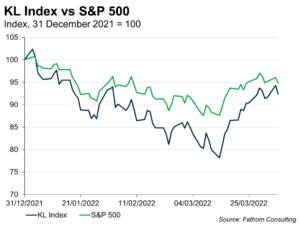A sideways look at economics
Discussing Russia-Ukraine with a colleague, they remarked that my usual policy prescriptions were biased towards dovishness and favoured the status quo: “Climate change? Do nothing. Fed interest rates? Do nothing. Russia-Ukraine? Do nothing,” This comment was made in jest (and is not accurate!), but there was a nugget of truth in there. One that I’m willing to defend. Of course, a world where nobody did anything wouldn’t work. Doing something is rightly the default position for almost everything. However, sometimes doing something is a mistake, and in those cases, we should resist it.
Markets:
It’s well-known that few individuals consistently beat the market, but that doesn’t stop many from trying. If you’re after long-term returns, it’s better to invest in equity indices instead of picking individual stocks. I know this, and mostly practice it, but also maintain a trading account, where I will only invest in companies whose goods and services I personally enjoy. Think of it as borrowing from Warren Buffett’s approach to mostly investing in companies he himself understands, but switch Coca-Cola for Diageo, and Bank of America for Twitter. Despite a post-Elon boost to the addictive home of doomscrolling, the returns to this group of companies (aka the KL Index) has still underperformed the S&P 500 so far this year (by a lot at times).

So while I enjoy Nike shoes, the better financial approach would be to buy a pair but put my savings in the S&P 500 or the Bottomless Brunch Index rather than in swoosh shares. (An even better financial approach would be to buy cheaper shoes.) One of our strategists suggests that an index based on companies I dislike (as fear can be more powerful than love) may offer better returns, but that feels a bit too much like betting on Liverpool to me.
COVID-19:
This is a lighthearted blog and not the appropriate venue to bring back what are hopefully becoming ancient pandemic disagreements. Nonetheless, I think most would now accept that some of the rules aimed at controlling the spread of disease went too far. I previously wrote about this in the context of international travel. A recent podcast with two well respected scientists (Monica Gandhi and Aaron Carroll) that I listened to, suggests that school closures are increasingly being seen in this vein. While there will probably never be unanimity among people about what was and wasn’t necessary, I think it’s fair to say that politicians faced public pressure to ‘do something’ and this need to be seen to be doing something was to blame for sometimes confused policymaking.
Geopolitics:
When bad things are happening, there is a natural desire to want to help. Seeing innocent civilians come into harm’s way due to someone else’s malicious actions should always strike a chord. The natural instinct among political leaders is to respond, both to ward off future rulebreakers but also because it’s what the public wants and expects. This response is sometimes violent. And while the intentions may be good, the outcomes aren’t necessarily. Indeed, since the turn of the millennium, there is a much easier case to be made against US military intervention than in favour of it. It’s something that is worth bearing in mind whenever someone argues in favour of ‘doing something’ with bullets and bombs.
Overall, I think a mistake sometimes made by those who advocate doing more, is to overstate the ability for their decisions to overcome structural forces. Sad as it is, the goods and services I enjoy are not necessarily representative of future returns. It’s a struggle to accept the world as it is, rather than as we wish it were. However, people sometimes want to do something, even if it doesn’t help much, or actively makes things worse. It at least indicates effort and ownership. This is known as action bias. Sometimes doing something is a distraction and won’t help. When that’s the case, there’s nothing wrong with doing nothing.
Other blogs by this author:
Do you know it’s Christmas?
Coming to America
OK boomer
Beating Mark Carney’s marathon time
The most wonderful country in the world